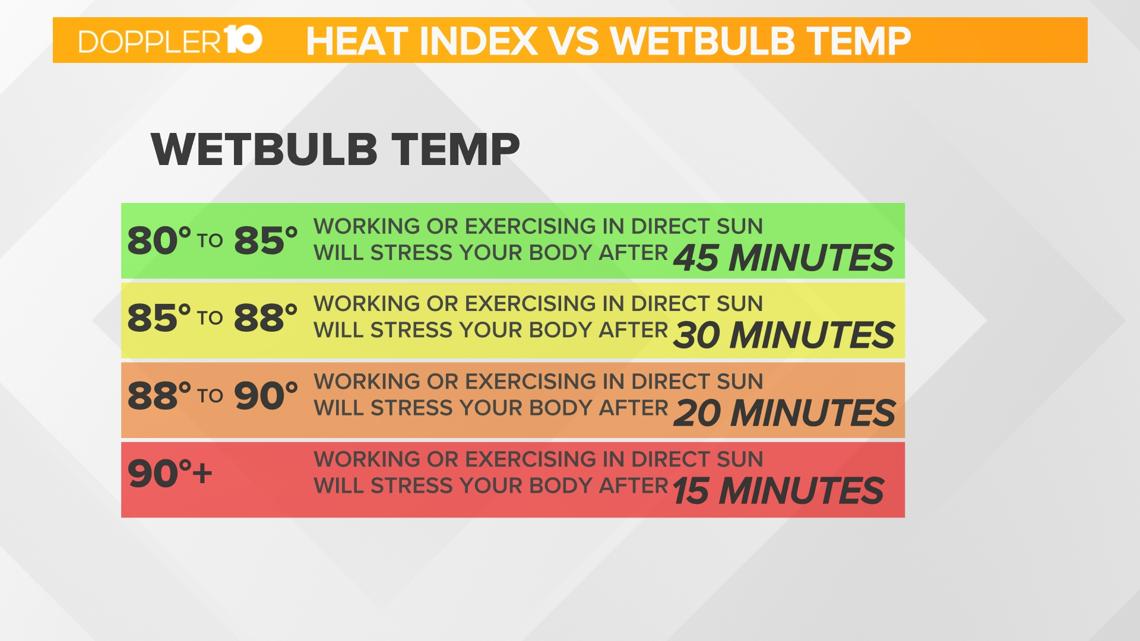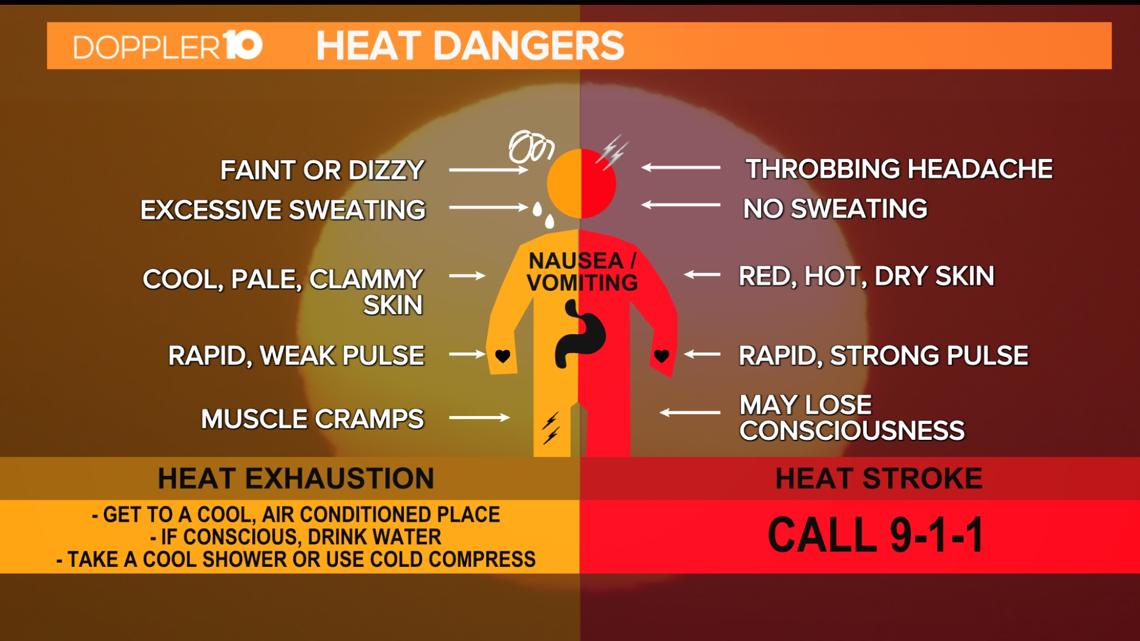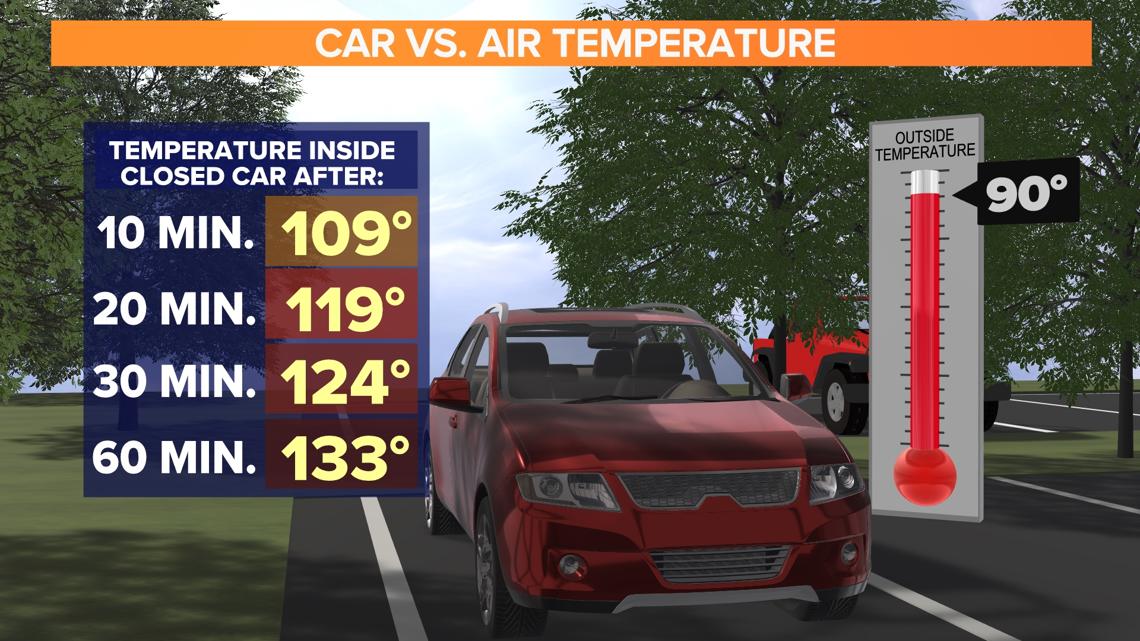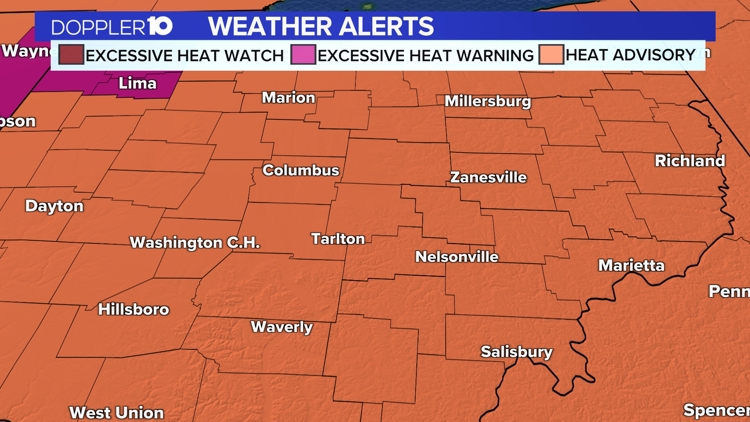COLUMBUS, Ohio — The Heat Advisory for most central Ohio counties expired Saturday at 8 p.m. after six days of sweltering temperatures.
The heat wave brought temperatures in the mid to high 90s for most of the week.
High heat and humidity elevated the risk for heat-related illness all week.
Dew points were in the 70s, making our highs in the 90s feel more like 100.
The longest heat wave ever recorded in Columbus is tied for 12 days (at or above 90). This happened in 1949, 1999 and 2020. It looks like we could potentially rival that all-time record as our temps will remain above 90 through the week.


Heat exhaustion occurs when the body becomes dehydrated and can't regulate its temperature due to exposure to the heat. Symptoms include heavy sweating, weakness, dizziness, nausea and headache.


If untreated, heat exhaustion can progress into heat stroke, which is a medical emergency. Heat stroke is life-threatening, and symptoms include lack of sweating, confusion and loss of consciousness.
It’s also important to remember not to leave kids or pets in the back seat of a vehicle, as temperatures can reach 124 degrees inside a vehicle in less than 30 minutes.


Heat Watch vs. Heat Warning
*Info provided by the National Weather Service
Excessive Heat Warning
An Excessive Heat Warning is issued within 12 hours of the onset of extremely dangerous heat conditions. The general rule of thumb for this Warning is when the maximum heat index temperature is expected to be 105° or higher for at least 2 days and nighttime air temperatures will not drop below 75°; however, these criteria vary across the country, especially for areas not used to extreme heat conditions. If you don't take precautions immediately when conditions are extreme, you may become seriously ill or even die.
Excessive Heat Watch
Heat watches are issued when conditions are favorable for an excessive heat event in the next 24 to 72 hours. A Watch is used when the risk of a heat wave has increased but its occurrence and timing are still uncertain.
Heat Advisory
A Heat Advisory is issued within 12 hours of the onset of extremely dangerous heat conditions. The general rule of thumb for this Advisory is when the maximum heat index temperature is expected to be 100° or higher for at least 2 days, and nighttime air temperatures will not drop below 75°; however, these criteria vary across the country, especially for areas that are not used to dangerous heat conditions. Take precautions to avoid heat illness. If you don't take precautions, you may become seriously ill or even die.
Excessive Heat Outlooks
The outlooks are issued when the potential exists for an excessive heat event in the next 3-7 days. An Outlook provides information to those who need considerable lead time to prepare for the event.
How to stay safe & cool in hot weather
Columbus Public Health reminds residents of ways to stay healthy and safe in hot weather:
- Drink plenty of water. Do not wait until you are thirsty.
- Stay in air conditioning whenever possible. If you do not have an air conditioner, use movie theaters, malls, libraries and other public places that are cool.
- Avoid beverages with alcohol, caffeine and sugar because they will dehydrate you.
- Eat light meals.
- Wear lightweight, light-colored clothing.
- Avoid strenuous activities and limit them to morning and evening hours.
- Learn the signs and symptoms of heat-related illnesses and how to treat them.
- Check on family members, friends and neighbors.
- Never leave people or pets in a closed car.
Taking care of your child in the heat
Dr. Ryan Squier, an emergency room physician at Riverside Methodist Hospital, said the best time to be outside with your kids is around 6 or 7 in the morning or closer to sunset.
Dr. Squier said kids are the most vulnerable in the heat because their bodies don’t cool as quickly as adults. He said parents should be mindful while taking their kids outside that means limiting time outside to 30 minutes to an hour for young children.
He also said you should regularly check on your child, especially if they are in a stroller by giving them lots of water, providing them with as much shade as possible, adding baby safe fans to your stroller, and taking regular breaks.
Exercising in the heat
Despite a lot of people are still outside exercising, Dr. Squier said to avoid the extreme heat times for working out, which is from 10 a.m. to 7 p.m. He said to be mindful of your running, so realize you may not be able to run as far as you normally do because of the heat.
“Ultimately its overexerting yourself and it’s going to raise your body temperature because it cant cool down like it normally does when you perspire and that is when people get heat related injuries,” said Dr. Squier.


David Babner, with MS3 sports, said a lot of people are preparing for marathons and half-marathons during the summer, but he said that doesn’t mean you have to run outside. He recommends trying a treadmill, and if you do run outside then wear light clothes and hydrate before and after your workout.
“I know people are following training schedules to get ready for the half in August but be smart, use common sense. If you can run with other people so you are watching out for everybody,” said Babner.
Cars in the heat
The heat could have a negative affect on your car. Luke Walker, the owner of Luke’s auto said it’s a busy time of year for their shop because of the hot weather.
Walker said one thing you can do to keep your car cool is hit the re-circulation button in your car so your car uses cool air inside to recirculate instead of the hot air outside. Walker said its never a bad idea to get your car battery, cooling system and AC system checked before it gets even warmer.
“On all systems of your car they are going to be under more stress during either temperature extreme so hot or cold. If there is on the car near the point of failure sometimes that temperature extreme will cause it to fail,” said Walker.



